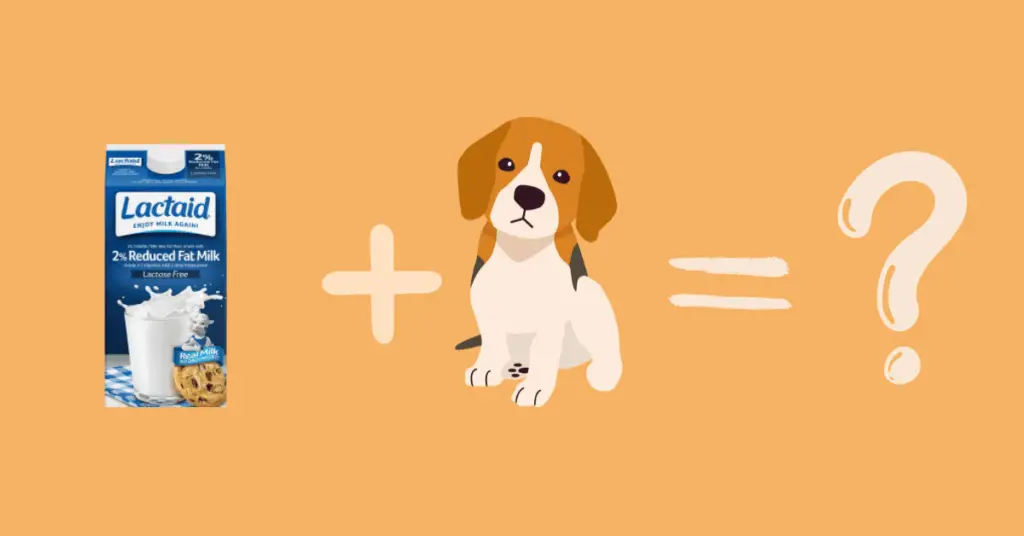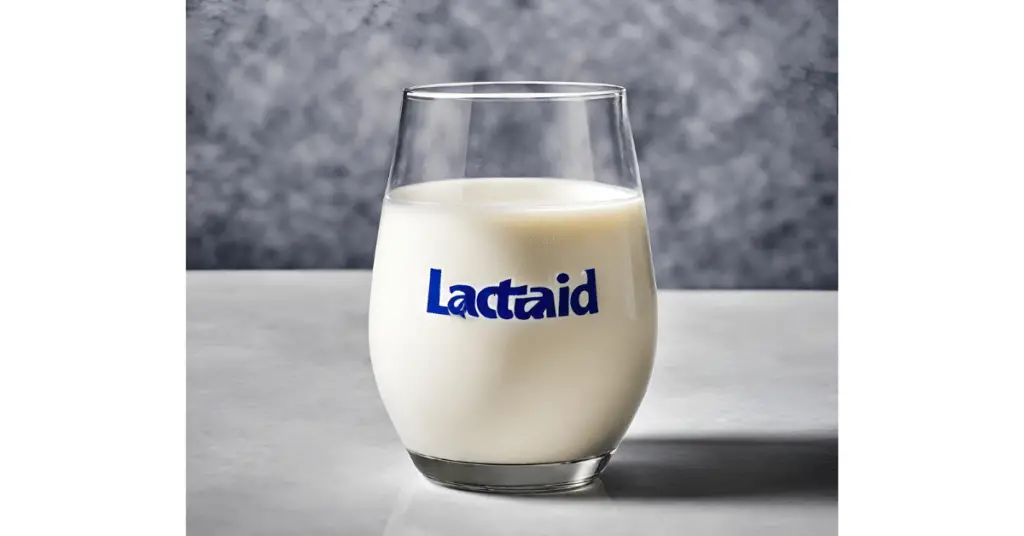
Can dogs drink Lactaid milk? This question might have crossed your mind, especially if you’re a dog parent considering alternative dietary options for your furry friend. In this blog, we’ll dive into the canine-friendly aspects of Lactaid milk, its benefits, and whether it’s a suitable choice for your dog. We’ll also address related concerns about Lactaid milk for dogs and offer guidance on what to do if your dog has consumed it.
What is Lactaid Milk and Is It Safe for Dogs?
Lactaid milk is a specially treated dairy product designed for people who are lactose intolerant. It contains an enzyme called lactase that breaks down lactose, making it easier for individuals with lactose sensitivity to digest. But can dogs drink Lactaid milk? The short answer is yes, they can!
Can dogs drink Lactaid milk?
Can dogs drink Lactaid milk? Yes, they can! Lactaid milk is formulated to be gentle on a dog’s stomach, making it a suitable option for those with lactose sensitivity. It’s a lactose-free alternative that allows dogs to enjoy dairy without the digestive issues associated with regular milk. However, it’s important to provide it in moderation and monitor your dog’s reaction to ensure it agrees with their system.
Nutritional content of LACTAID milk
Lactaid milk offers a valuable nutritional profile, making it a popular choice for those seeking a lactose-free dairy option. According to information provided by LACTAID, a leading lactose-free dairy brand, this milk variant retains essential nutrients found in regular milk, ensuring individuals with lactose sensitivity can still enjoy the goodness of dairy without digestive concerns. Let’s delve into the key nutritional aspects of Lactaid milk to understand the benefits it can bring to a balanced diet.
| Lactose-Free | Yes |
| Serving Size | 1 Cup |
| Calories | 130 |
| Total Fat (g) | 5 |
| Sugars (g) | 12 |
| Added Sugars (g) | 0 |
| Protein (g) | 8 |
| Calcium (mg) | 300 |
| Vitamin A (mcg) | 150 |
| Vitamin D (mcg) | 2.5 |
Benefits of Lactaid Milk for Dogs
1. Lactose-Friendly Option
Lactaid milk is essentially lactose-free or has significantly reduced lactose content, which is beneficial for dogs that may have lactose intolerance.
2. Nutrient-Rich
Lactaid milk retains essential nutrients found in regular milk, providing your dog with calcium, vitamins, and protein important for their overall health.
3. Digestive Comfort
For dogs with sensitive stomachs, Lactaid milk can be a gentler dairy option, reducing the risk of digestive discomfort.
Is Lactaid Milk Bad for Dogs?
Lactaid milk is generally safe for dogs, but like any treat, moderation is essential. It’s designed to be gentle on sensitive stomachs, making it a potential option for your furry friend. However, giving too much can lead to digestive issues, so it’s best to offer it in small, occasional servings.
My Dog Drinks Lactaid Milk – What Should I Do?
If your dog has consumed Lactaid milk and starts to display signs of digestive discomfort, such as diarrhea or an upset stomach, it’s crucial to keep a close eye on them. Make sure your pup has ample access to water to keep them well-hydrated and happy. If the symptoms persist or worsen, consulting your veterinarian for personalized advice and guidance is a prudent step to take. Your vet can provide recommendations based on your dog’s specific situation.
Using Lactaid Milk for Dogs: Best Practices

To ensure your dog receives the maximum benefits from Lactaid milk:
Offer in Moderation: Treat Lactaid milk as an occasional treat rather than a primary source of hydration.
Observe Reactions: Monitor your dog for any adverse reactions after consumption, and adjust accordingly.
Veterinary Guidance Matters: Seeking advice from your vet before adding any new items to your dog’s menu is a responsible pet parent’s best practice.
Lactose intolerance in dogs
Lactose intolerance in dogs is a condition where a dog’s digestive system struggles to properly break down lactose, a sugar found in milk and dairy products. Just like some humans, dogs can be lactose intolerant, leading to gastrointestinal issues after consuming lactose-containing items. The lactase enzyme, responsible for breaking down lactose, might be insufficient in lactose-intolerant dogs. This deficiency can cause symptoms such as diarrhea, stomach cramps, flatulence, and discomfort. Understanding your dog’s tolerance to lactose is essential, as it helps in choosing appropriate dietary options like lactose-free alternatives such as Lactaid milk that won’t upset your furry friend’s stomach.
How frequently can dogs have milk?
Dogs can have milk, but it’s best given to them in moderation. Too much milk can lead to digestive issues, particularly if the dog is lactose intolerant. As a general guideline, providing milk as an occasional treat is a safe approach. Some dogs may tolerate it better than others, so observing your dog’s reaction to milk can help determine how often you can offer it. It’s important to consult your veterinarian for advice tailored to your dog’s specific needs and dietary requirements. Always prioritize water as the main source of hydration for your dog.
Alternative of milk for dogs
When it comes to offering your dog dairy alternatives, there are several paws-itively great options that can keep tails wagging and tummies happy. Here are some alternatives to milk that your furry friend might woof with delight:
- Clear Water: Water is the ultimate go-to beverage for your pup, ensuring they stay hydrated and healthy.
- Bone Broth: Homemade bone broth is a delicious option, providing essential nutrients while being gentle on your dog’s stomach.
- Yogurt: Plain, unsweetened yogurt is a canine-friendly dairy option rich in probiotics, aiding digestion and promoting gut health.
- Coconut Milk: Coconut milk, with its creamy texture and lack of lactose, can be a suitable alternative for lactose-intolerant dogs.
FAQ’s
Are all dogs lactose-free?
No, not all dogs are lactose-free. Some dogs, like some humans, may have varying levels of lactose intolerance, meaning their bodies have difficulty digesting lactose, a sugar found in milk and dairy products.
What milk is best for dogs?
The best milk for dogs is either lactose-free milk or milk specially formulated for canine consumption. Lactose-free milk ensures that lactose-intolerant dogs can still enjoy a dairy treat without digestive issues. Canine-specific milk is a safe and nutritionally balanced option, designed to meet a dog’s dietary needs.
Is lactose-free milk still milk?
Yes, lactose-free milk is still considered a type of milk. It’s regular milk from cows or other sources that has been treated to break down lactose into simpler sugars, making it easier to digest for those with lactose intolerance.
What milk can dogs drink?
Dogs can drink lactose-free milk or special milk formulated for them. Lactose-free milk has reduced lactose levels, which is easier on a dog’s digestive system. Always avoid giving dogs regular cow’s milk, as it can cause digestive upset due to lactose.
Can I give a puppy human milk?
It’s best not to give puppies human milk. Puppies have specific dietary needs that are met through their mother’s milk or specialized puppy formula. Human milk doesn’t provide the appropriate nutrients essential for a puppy’s growth and development.
What non-dairy milk is best for dogs?
The best non-dairy milk for dogs is unsweetened, plain almond milk or coconut milk in small quantities. Always ensure it’s unsweetened and doesn’t contain any flavorings or additives that could be harmful to dogs. However, water should always be the primary source of hydration for dogs. Always consult your veterinarian before introducing non-dairy milk or any new food into your dog’s diet to ensure it’s safe and appropriate for your furry friend.
Conclusion
So, can dogs drink Lactaid milk? Absolutely! It can be a suitable option for dogs, especially those with lactose sensitivity. However, always exercise caution and consult your veterinarian to determine the best dietary choices for your beloved canine companion. Remember, a happy, healthy dog is a well-informed owner away! 🐶

Thanks for sharing. I read many of your blog posts, cool, your blog is very good.
I was looking through some of your articles on this internet
site and I believe this internet site is rattling instructive!
Retain posting.Blog monry